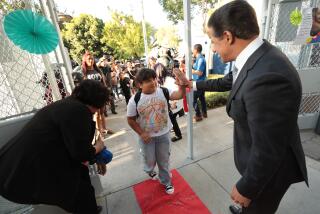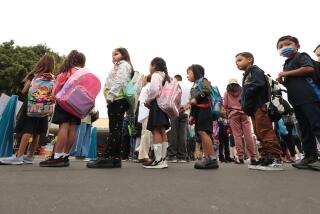6-Nation Survey Shows Koreans Far Ahead : U.S. Pupils Near Bottom in Math, Science
- Share via
WASHINGTON — The Educational Testing Service, in a six-country survey sure to bolster the harshest critics of American education, reported Tuesday that 13-year-old American schoolchildren score worse in mathematics than any of their counterparts and fall close to the bottom in science as well.
The results, which put the American children far below the achievement levels of the top-level Korean children of the same age, are sure to fuel the growing complaints that American schools are failing to train youngsters to help the United States meet intensifying international economic competition.
The results also will add to the pressure on President Bush to devote more federal funding for education. But Bush Administration officials have indicated that, in light of the budget deficit, there will be little available for such spending.
Calls Results ‘Sobering’
The Educational Testing Service, the Princeton, N.J., organization that is the best-known tester of student achievement in the United States, described the results as “sobering.”
Not only did the United States fall far behind Korea, a society that is regarded as one encouraging high achievement in pupils, but it also was significantly behind Spain, which does not enjoy the same reputation as the United States for scientific achievement.
The report also surveyed students in Britain, Ireland and four Canadian provinces--British Columbia, New Brunswick, Ontario and Quebec.
Studying the results in mathematics, the authors of the report said: “The position of the United States as last in overall achievement heightens concern for the future in an increasingly competitive world. Today’s 13-year-olds will be the voters of 1993 and the country’s employees of 1995. Their ability to understand mathematical concepts and solve problems will determine their individual success and the collective prosperity of the nation.”
Though the Americans scored slightly better in science, the authors of the report were just as pessimistic in analyzing those results. “The United States has traditionally thought of itself as technologically innovative and in the forefront in science,” they said. “These results . . . pose a serious challenge to our position in the world community.”
In a touch of irony, the results indicated that American schoolchildren seemed unaware of their failings. In reply to a questionnaire, 68% of the Americans replied, “I am good at mathematics.” Only 23% of the Koreans said the same.
The mathematics results put Koreans (with a score of 568) in first place in a class by themselves, followed by most Canadians (between 514 and 543), Spaniards (512), Britons (510), Irish (504), French-speaking Ontarians of Canada (482), and Americans (474). Only the French-speaking Ontarians and the Americans scored below the average of the total 24,000 children tested.
In the science tests, British Columbian children of Canada (with a score of 551), followed very closely by Koreans (550), scored highest. Behind them were Britons (520), most Canadians (between 511 and 515), Spaniards (504), Americans (479), Irish (469), and French-speaking Canadians of Ontario and New Brunswick (468). Only the Americans, Irish, and the French speakers of Ontario and New Brunswick scored below average.
While 78% of the 13-year-old Koreans could use intermediate skills to solve what are known as two-step problems, only 40% of the Americans could do so. Moreover, while 40% of the Korean children understood geometric concepts and could apply a whole range of strategies to complex mathematical problems, only 9% of the Americans could do so.
The difference in scientific achievement was on a similar scale. While 73% of the Korean schoolchildren had a grasp of scientific experimental procedure and the ability to analyze scientific data from graphs and their own observation, only 42% of the American schoolchildren had the same skills.
Although the report did not delve deeply into the reasons for the different mathematical and scientific achievements, it did come up with some interesting differences in the attitudes of the children. While only 50% of the American children thought “much of what you learn in science classes is useful in everyday life,” 82% of the Korean children did so.
More to Read
Sign up for Essential California
The most important California stories and recommendations in your inbox every morning.
You may occasionally receive promotional content from the Los Angeles Times.













